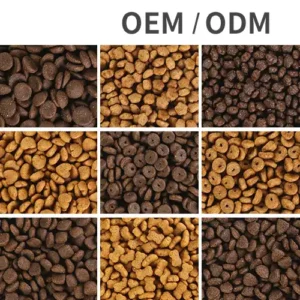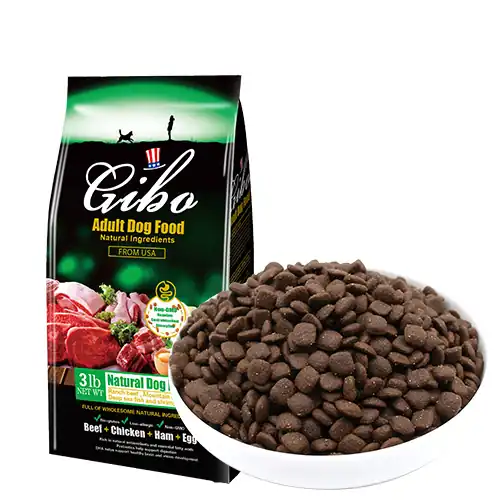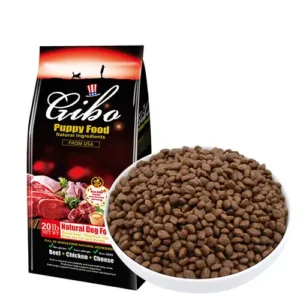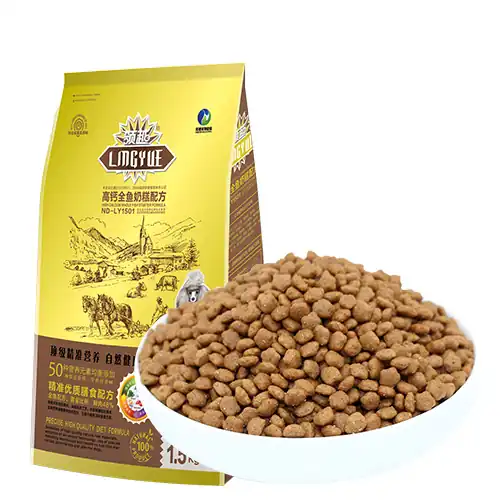In this article, we have compiled 5 common reasons why dogs do not eat, as well as a full range of old dog dietary guidelines that focus on the dietary priorities and nutrients that need to be supplemented, to help us on the way to caring for our dogs, all kinds of situations can be successfully dealt with.
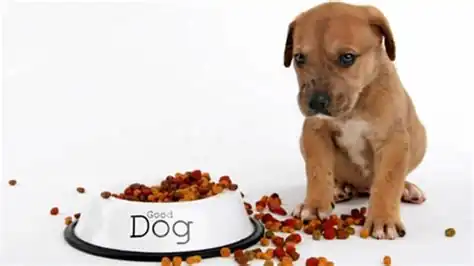
5 Reasons Why Old Dogs Don’t Eat, Have No Appetite
After the dog is older, the body function will begin to appear condition, if the original appetite are very normal, suddenly began to not eat the situation, you need to find out why the dog does not eat, and then from the reasons to start to effectively solve the problem of the dog does not eat.
Dogs do not eat reason 1 – oral problems
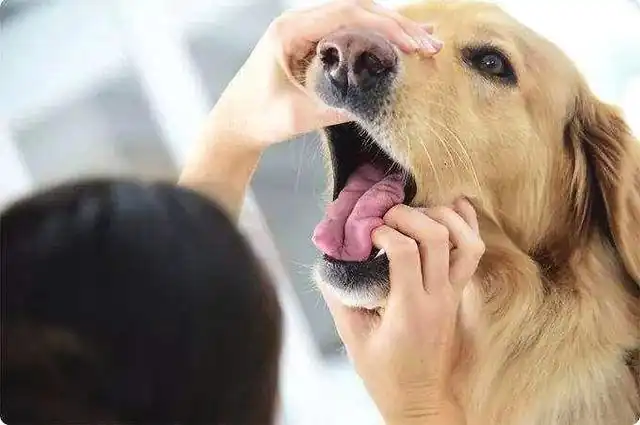
Old dogs often have oral disease or periodontal disease, swollen gums, broken teeth and other dental problems, these reasons will make them have pain and uncomfortable feelings, affecting the willingness to eat.
Dogs don’t eat reason 2-Digestive problems
Digestive problems such as upset stomach, gastrointestinal inflammation, indigestion and bloating can cause dogs to suddenly stop eating. Gastrointestinal problems can be accompanied by vomiting and diarrhea, stomach pain and other symptoms.
Dogs do not eat reason 3-parasites
Including roundworms, coccidia, heartworms, etc., may cause discomfort and affect the appetite of the dog, so regular deworming of the dog is also something to remember as a feeder.
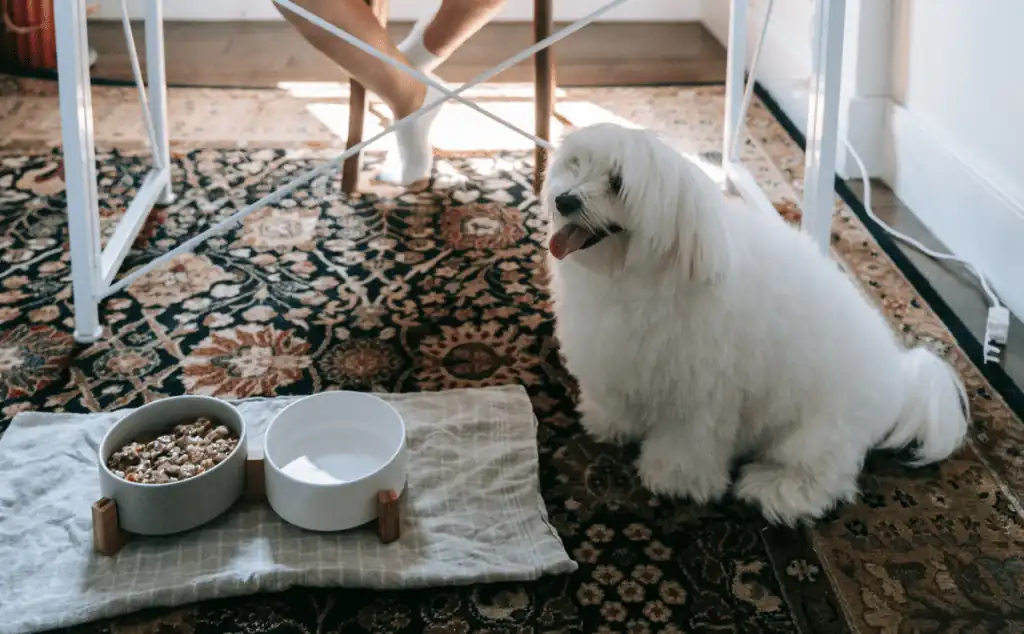
Dogs do not eat reason 4-environmental changes
Although cats are more sensitive to changes in the environment compared to dogs, it does not mean that dogs will not be affected by changes in their surroundings. If the dog’s living environment has changed in a different way, such as the emergence of new members of the family, moving to a new home, etc., the dog may produce stress and anxiety, which in turn leads to a decline in appetite.
Dogs do not eat reason 5 – disease effects
Dogs over seven years old can be said to be mature dogs, and mature dogs, old dogs often have many chronic or old age diseases, such as heart disease, kidney disease, cancer tumors, etc., will be the reason for no appetite. At this time, the first priority is to treat the dog’s disease, when the uncomfortable symptoms are relieved, the appetite may also be restored.
How can I tell if my dog’s appetite and water intake are normal?
The amount of food and water consumed varies from dog to dog due to different living environment, habits, size and breed. Even for dogs of the same breed with similar body weight, the calorie requirement will be different due to different living habits, physical fitness and metabolic rate. You can observe your dog’s eating status and amount of food, if it becomes different from the past, you should pay attention to whether there is a health problem.
In addition, the hairy parents can also fix every month for the dog weight measurement, from the weight increase or decrease, to determine whether the diet is too much or too little, and then make adjustments.
5 Tips to Improve Your Dog’s Lack of Eating
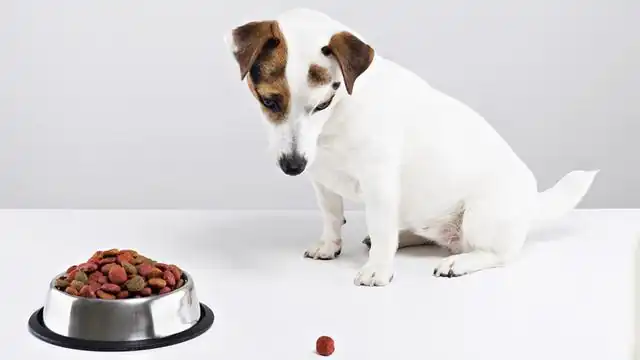
If the dog suddenly does not eat, the first step will be to determine the reason why it does not eat. If it is because of physical discomfort, we must first focus on the uncomfortable place to improve the treatment; if you exclude the cause of the disease, then you can try to improve the dog does not eat according to the following ways:
Improve the old dog does not eat the way 1 – change the type of food
If you eat the same food every day, it is easy to get bored, and dogs are no exception! You can try to change the brand and flavor of the feed he eats, or add some cooked meat, vegetables, etc. to make his food more diverse.
Improve old dog not eating the way 2 – small amount of meals
Older dogs may have some digestive problems and poorer gastrointestinal function. It is recommended to provide a small amount of food at a time, and then divide it into several feedings to reduce the burden on the stomach and intestines. At the same time, it is not recommended to let the dog starve for too long to avoid increasing the chance of gastrointestinal discomfort.
Improve old dog not eating the way 3-soften food
Old dogs often have bad teeth, oral diseases and other problems, if the food is too hard to bite, it will also affect their willingness to eat. In this case, canned food is a good choice! Compared to feed, the texture of canned food will make it easier for dogs with bad teeth to eat.
Improve Old Dog Skipping Meals #4 – Hydrate Your Dog
When your dog is dehydrated, there are a number of symptoms that can occur, and one of them is that it can affect their appetite. One of the symptoms is that it affects their appetite. Therefore, it is important to have plenty of clean water in the environment where your dog lives. Not only will your dog have a healthier body, but it will also increase your dog’s appetite.
Improve old dog not eating the way 5-Increase food temperature
Heat up the food a little bit, the aroma of the food will also be emitted, so that the dog smells the appetite, and may be more willing to open the mouth to eat!
5 Ways to Solve Your Old Dog’s Picky Eating Problem
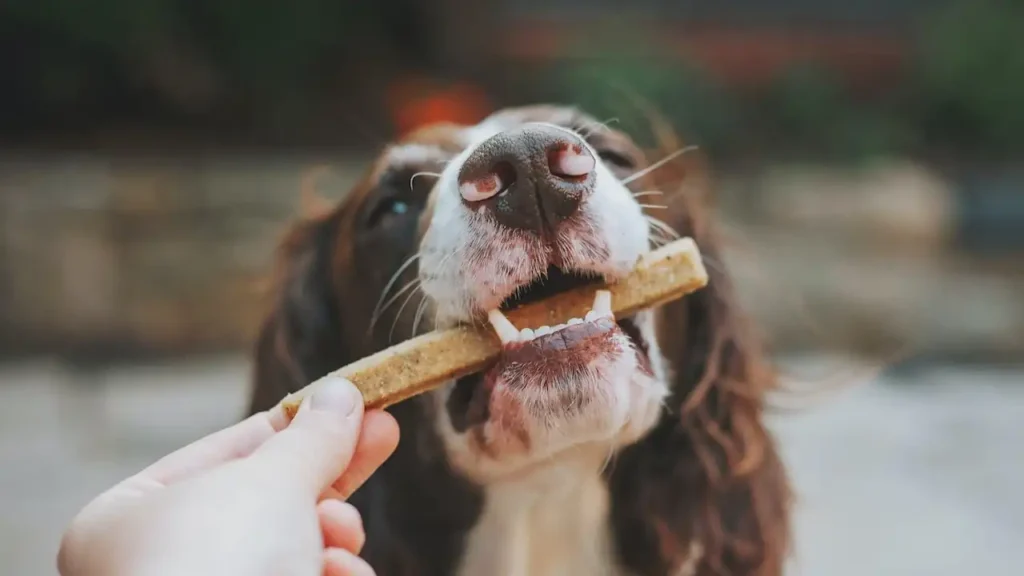
There are a number of ways to help correct the problem of picky eating in dogs! Below is a list of ways to correct picky eating dogs, but we still need to measure the situation of your dog to adjust, if it is an old dog, it is not recommended to use too drastic way to deal with it!
How to solve the problem of picky eating in dogs 1-Feeding at regular time and quantity
Set a meal time of 20-30 minutes, if the meal is not finished after that time, the food should be put away until the next meal time. The amount of food in each meal should be controlled. Quantitative feeding allows you to observe your dog’s food intake, and if you need to increase the amount of food, it is recommended that you increase the amount of food slowly. This method is more suitable for healthy dogs, but for old dogs, it is recommended to feed small amount of food at a time, taking into account the digestive system.
Solve the problem of picky eating in dogs 2-control the time of snack feeding
Don’t give snacks to your dog when the main meal is not good. Instead, treat the snacks as a reward for finishing the meal, and don’t overfeed the dog, so that the dog doesn’t eat too many snacks and can’t eat the main meal instead.
How to solve the problem of picky eating in dogs 3- Cut the amount of food for the next meal in half.
If your dog doesn’t finish the food, then cut the amount of food you feed him in half for the next meal, and then slowly adjust the amount of food you feed him back after he regains his appetite. This way is to build up the dog’s hunger, so that it will be more interested in food.
How to solve dog’s picky eating problem 4 – Food diversification and temperature adjustment
Change the flavor or brand of the feed your dog eats at the right time, so that he can eat something different; in addition, heating your dog’s food so that the aroma of the food spreads out is also very helpful in boosting your dog’s appetite.
Solve the dog picky eating method 5-increase the amount of exercise
Take the dog to exercise, can enhance the metabolism, relieve stress, and then enhance the dog’s appetite Oh! Do not necessarily have to intense exercise, and can depending on the physical condition of the dog to carry out suitable exercise, especially the old dogs often have problems with the joints, choose to walk around the home, stroll, is also a good way.
Dietary precautions for old dogs
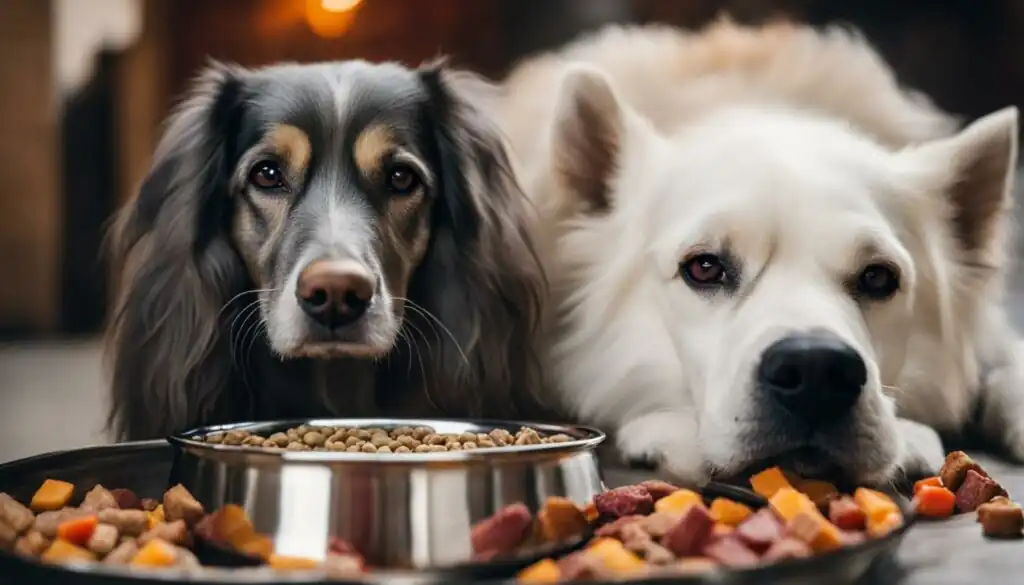
Dietary Guidelines for Elderly Dogs 1-Low Sodium
Human food is too heavy for dogs, and the sodium content is too high, which will increase the body burden of old dogs. In order to minimize the burden on the heart and kidneys, the diet of dogs should be as low in sodium as possible.
Dietary Note 2 for Old Dogs – High Quality Protein
Dogs tend to lose muscle mass, muscle strength and weight when they get old, so increasing the amount of high quality protein can help dogs maintain their muscle mass.
Points to note in the diet of old dogs 3 – good digestion
The gastrointestinal digestive system of old dogs is usually weaker, so it is recommended to choose well-digested and well-chewed food to make it easy for the fur child to enter the mouth, and at the same time, it is also good for the stomach and intestines to absorb.
Diet for Old Dogs 4-Antioxidant Foods
Supplementing your old dog with antioxidant foods, such as broccoli, blueberries, groundnuts, and pumpkin, can help remove free radicals and prevent cells from being damaged by free radicals.
Dietary FAQs for Old Dogs
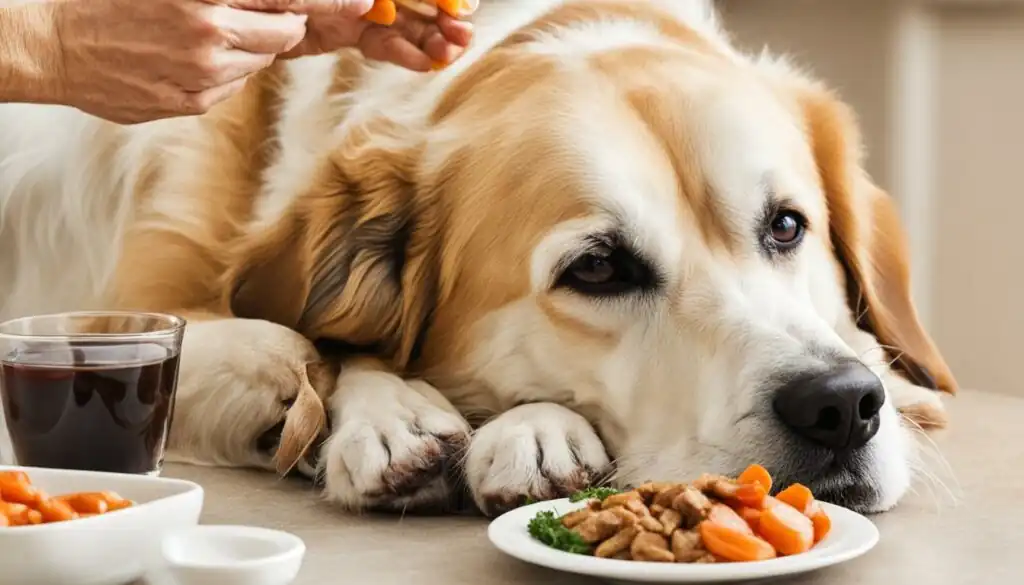
Diet for Old Dogs FAQ 1 – Is it okay for an old dog to skip meals and only drink water?
Generally, dogs can go without food for 3 to 5 days, but it is important to be aware of the need to take in water to avoid dehydration! If your dog has a normal appetite and suddenly starts to skip meals and only drink water, it is likely to be caused by oral pain or kidney problems, so you need to see a doctor as soon as possible to find out the cause.
Old Dog Diet FAQ 2 – How many days can an old dog last without food?
If your dog suddenly stops eating, make sure it is due to picky eating. If it’s not, and the dog doesn’t want to eat for more than 24 hours, take him to a veterinarian for a checkup to find out the cause and prescribe the right medication.
Elderly Dog Eating FAQ #3 – What are the signs that a dog is dying?
It’s hard to face, but after years of being close to your fur child, sooner or later the moment will come. What are the signs and symptoms that may occur before a dog’s death?
Dog Dying Symptoms 1 – Drowsiness
Your dog may become more sleepy than before, often sleeping all day and looking less energetic.
Signs 2 – Loss of Interest in Surroundings
Dogs lose interest in everything around them, including favorite toys that they no longer play with, and lack of interest in anything that used to interest them. This may be due to the fact that the dog is tired from over-activity and has no energy to socialize and interact with others.
Dog Dying Symptoms 3 – Loss of Appetite
As dogs get older, their appetite decreases, and in the case of a dying dog, they may not be interested in food at all.
Dog Dying Symptoms 4 – Weight Loss
If the dog has symptoms of reduced appetite, it will lose weight rapidly because it eats less; and older dogs will also lose muscle mass, so their weight will naturally become lighter.
Dog Dying Symptoms 5 – Mood Changes, Irritability or Clinginess
Dogs may become irritable or clingy to their owners because they are not feeling well, so do not be angry with your dog or punish it.
Dog Dying Symptoms 6 – Irregular Breathing
Elderly Dog Diet FAQ 4 – As the body function of an elderly dog declines, it is likely that the dog will take a big breath at once, or pant rapidly, and may have difficulty breathing.
Dog Dying Symptoms 7 – Hiding
Some dogs feel that they are about to die, they will hide and don’t want to be seen by the owner, this is because of the nature of the dog, in order to protect their status and safety in the group, so they will hide.
Old Dog Diet FAQ 4 – How to supplement nutrition for old dogs?
There are many nutritional supplements on the market for joints, gastrointestinal health, immunity, eye care, etc. It is recommended that no matter what type of supplement you need, you should consult your veterinarian for professional advice before supplementing.
There are many ways to use the supplements, including powdered ones that can be mixed directly into the food; soft chewable tablets that can be eaten directly or flaked and mixed into the food; and oral liquids that can be drank directly, so you can choose the way that your dog accepts the most to make supplements. Regardless of the type of nutritional supplement used, it is important to pay attention to the recommended amount and frequency of feeding.

